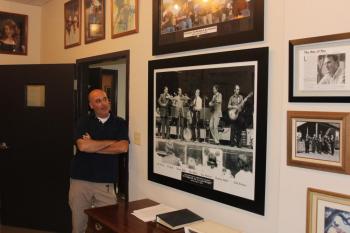
Chris Soileau, general manager of Flat Town Music Company, leans next to a framed photograph of J. W. Pelisia, Wil Balfa, Dewey Balfa, Tony Balfa, Ray Abshire, Rodney Balfa, and Dale Breaux performing at Le Premier Festival De Musique Acadienne on March 26, 1974. The Balfa Brothers were some of the artists who recorded for Soileau’s father Floyd over the 60 years of the company. (Gazette photo by Tony Marks)
Spinning vinyl to gold
By: TONY MARKS
Associate Editor
The music industry has changed over the years as the old vinyl 45 records have given way to a digital format. For the last 60 years, one music company in Ville Platte has changed with the times and has continued to meet the demands of South Louisiana artists who walk through the doors of Flat Town Music Company.
“What people here don’t understand or are not aware of is that the whole time the majority of the people were going to Floyd’s Record Shop and shopping in a retail store, there was a sister company running in the background,” said general manager of Flat Town Music Company Chris Soileau. “People from the area never saw the back side of the business. The consumer side never saw all of the studio sessions, the planning, the production, the marketing, all the paperwork for royalties, contract negotiations, and licensing negotiations.”
“When dad (Floyd Soileau) started Flat Town Music Company, its purpose was sort of a house for the record labels namely Jin and Swallow,” Chris continued. “Dad was recording at the very beginning both Cajun songs and what was known as South Louisiana Rock N’ Roll which is now Swamp Pop.”
Chris explained that when his dad first began doing his recordings he had to depend on record plants to manufacture the product. “He basically was recording on equipment with one and two track recorders in a little makeshift studio,” Chris said. “Dad would get the records pressed up and get them sent out.”
Since then at Flat Town Music Company, Floyd Soileau has been able to do all the aspects of production, publishing, and distribution of the records in house. “He had and still has a knack for making something out of nothing,” Chris said. “He had a lot of good hunches over the years with things.”
Chris’ sister Cathy Sylvester, who serves as bookkeeper for the company, pointed out that the first big hit for Flat Town Music Company was Rod Bernard’s “This Should Go on Forever.”
“That song allowed dad to get married,” explained Chris. “He said that it gave him the money for him and mom to get married, so that was a big thing. It was one of the first contracts he negotiated when he leased the song to a major label in 1957. It started Flat Town Music Company.”
After the success of “This Should Go on Forever,” Floyd Soileau again struck gold with Tommy McClain’s “Sweet Dreams,” and Johnny Allen’s “Overseas.”
“Those songs were big things that really kicked off the music company and allowed dad to grow and record more,” Chris said. “It’s like everything was kind of spaced out in the right amount over the years.”
While Jin Records was achieving success with Swamp Pop Music, Swallow Records was spinning out gold with Cajun French music from artists like Belton Richard, Bolfa Brothers, and Nathan Abshire. “Along the way, we befriended people like D. L. Menard who just passed away,” said Chris. “He was huge, and dad says today that ‘The Back Door’ is the Cajun National Anthem.”
Cathy added that her dad then had regional Cajun hits like “Opelousas Sosthene” by Rufus Jagneaux in the 1970s. During that time, Flat Town Music Company expanded into Zydeco music with Maison de Soul Records.
“We had a three-legged dog that was going in different directions with Cajun, Zydeco, and Swamp Pop,” Chris said. “Zydeco didn’t come in until the early 1970s when dad met Clifton Chenier, and he was huge for Zydeco because it’s what people knew Zydeco for.”
Since then Flat Town Music Company recorded the likes of John Delafosse, Boozoo Chavis, and Rockin’ Sidney. It was Rockin’ Sidney who allowed Flat Town Music Company to win its Grammy Award. “Back then the categories were different,” Chris said. “They had an ethnic music category, and we won for best ethnic recording with Rockin’ Sidney’s ‘Don’t Mess With My Toot-Toot’ on the Maison de Soul label.”
The 1980s brought the first wave of change to Flat Town Music Company. “Dad made some adjustments because he ended up obtaining some book rights on a couple of publications,” said Chris. “We ended up reincorporating the business into Swallow Publications, Incorporated, and it’s been that way ever since then. We never gave up the name Flat Town Music Company because it was always our business name in the recording industry and in the publishing division.”
Then the 1990s was the decade when two of Floyd’s children began working for Flat Town Music Company. Chris started full-time in 1999. He said that he ran the record manufacturing plant before then off-and-on from 1989 to 1995. Cathy went on board in 1991. She said, “I started when dad needed somebody to come in and help with the royalty accounting and design a royalty accounting system for the computer.”
Chris said, “Cathy was the computer programmer of the family. When we started doing royalty accounting, it was all DOS based, but she wrote the grid for the new Windows based data base and programmed it to where a formula would spit out everybody’s portion of the royalties.”
That same decade brought Flat Town Music Company into the households of a new generation with artists such as Wayne Toups, Steve Reilly, and Keith Frank.
“‘Take My Hand’ was huge,” Chris said. “Travis Thibodeaux was the writer of the song and had a little feminine voice. He was a little kid when he wrote it. He did a version of it for us, and it was like a little girl was singing it. He wrote two good songs for Wayne Toups over the years, but ‘Take My Hand’ was the big one.”
“We did a Steve Reilly album in 1997 right after Take My Hand called Friday at Last,” continued Chris. “I think it’s the best album Steve’s ever done of his traditional sound. My second favorite is Live at the VFW in Eunice, but that Friday at Last album sold enough to really claim that top spot.”
According to Chris, the younger generation really turned onto Keith Frank and his first album What’s His Name. “I’ll never forget this because Stuart (Fontenot) was doing the art department back then, and dad would bring the materials in for the albums,” Chris said. “Stuart was real young and intimidated by dad back then.”
Chris added, “Stuart asked dad what was the name of the album. Dad turned around and said ‘What’s His Name.’ Stuart said, ‘Keith Frank.’ Dad said, ‘What’s His Name.’ Stuart said, ‘Keith Frank.’ Dad said, No, the name of the album is What’s His Name.”
The turn of the century brought more change for Flat Town Music Company as it entered digital age. “The digital age changed the business a lot for everybody including dad,” said Chris. “He was a master of the business, but the distribution rug was pulled out from under him. Then came iTunes and all of the digital formats, so as bad as it seemed it was like this was the new single. That was the way people began to buy our music, and it was like they were getting that 45 again.”
“We went out on a limb with that in 2005, and there was the head-to-head with Floyd’s Record Shop,” Chris continued. “That was the hard part for us because we didn’t have a choice, but we knew we were sort of competing with our sister company because they were selling the physical product and couldn’t sell digital. We were the label, so we sold digital products to a digital wholesaler.”
Flat Town Music Company today continues to provide services for such artists as Adam Hebert and Zydeco Force. and in the process is preserving the local culture. Cathy described it as “keeping our culture alive for one thing, and it’s our family tradition.”
Chris concluded, “There’s not a lot that our South Louisiana Cajun heritage has left that is really rooted deep. Music is one of those things. I’m glad to be able to keep the stuff that we have in print because there are a lot of South Louisiana record labels who have come and gone. I’m glad to be able to have an opportunity to come in the mornings and unlock and turn the lights on and do business because we have a lot of people that still look to us to buy the products and have access to it. I’m grateful to have a chance to do that.”
- Log in to post comments

